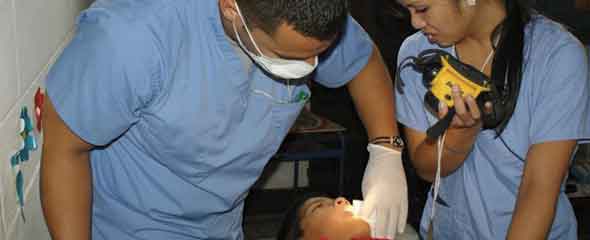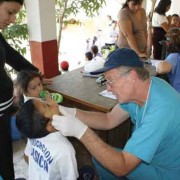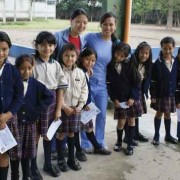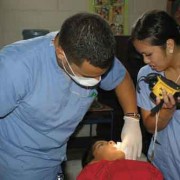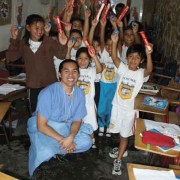A Smile Goes A Long Way
Written by Malia Dewse photos: Nate Gerodias and Malia Dewse
The Emergency Dental Project is in its fourth year and going strong
The impact of small voluntary projects, driven by one or two people with a passion for what they are doing, cannot be underestimated. One such project has provided free written dental examinations, fluoride treatment and emergency extractions to over 1,000 schoolchildren in La Antigua and Jocotenango.
Dr. Bob Renner, professor emeritus at the School of Dental Medicine, University at Stony Brook in New York, had a long history of undertaking voluntary dental care when he started the Emergency Dental Project in La Antigua along with his wife Purobi Phillips four years ago. Through the encouragement and assistance of Gail Rogers, the proprietor of a local hotel, Bob and Purobi performed emergency dental care at a number of organization-run health clinics in La Antigua. That first year they treated approximately 600 children. As Purobi says with a smile, “There were very long days with very short lunches.”
Dental health affects the general well-being, development and educational achievement of children.
Today the Emergency Dental Project works in partnership with Casa del Niño, and it receives some additional support from the Municipality of Jocotenango. This year Bob and Purobi, along with five dentists and six dedicated students and non-medical volunteers, flew at their own expense to Guatemala to provide dental care to students attending six local schools and other organization-run health clinics. With assistance from local volunteers the 16-member team was the largest one to date.
Logistics and planning were challenging. Every morning long lines of soon-to-be patients were already waiting as the team arrived to set up makeshift treatment centers. All the necessary supplies, including the equipment, sterilizing materials and 1,000-plus toothbrushes for children attending the clinic, were bought and brought from the States by Bob and Purobi.
All of the other supplies and equipment were improvised from whatever resources were available. Tiny school chairs and desks and a few old dental chairs were set up in hallways, classrooms or the schoolyards. Order was imposed on chaos as children were channeled to those receiving examinations and then on to the application of a protective fluoride treatment. Every child received a toothbrush, and those needing fillings or X-rays received information on Casa del Niño, which provides this type dental care. Unfortunately, more than 40 percent of the children who were examined had tooth decay so severe that they needed emergency extractions.
The benefits to so many children who were experiencing pain or infection are more than just immediate improvements to their physical health. Dental health affects general well-being, development and educational achievement.
So although Bob and Purobi describe their work as performing “crisis management,” they see the value of the project for both the local communities and the individual children. Moreover, for the past seven years they have been doing a similar dental program in El Salvador, and with repeated trips they are seeing a clear improvement in the overall dental health of the children whom they examine.
Bob has even broader aims: “I wanted to teach about volunteerism and open people’s eyes to the needs of others in the world.” The size of the team this year (three times larger than in 2007), as well as their passion, dedication and desire to return, says a great deal about his ability to bring the spirit of volunteerism into the lives of others.
There will be another opportunity next year, as extensive clinics are in the planning stages for a July 2009 trip; volunteers are much appreciated, also the group hopes to collaborate with local dentists and assistants. If the enthusiasm of those involved at this year’s clinic is anything to go by, the ones next year will be an experience not to be missed.
For more information about this project, volunteering (professionals and assistants) for the 2009 trip, contact Bob Renner.
- “Open wide” for Dentist Bob
- Children waiting with examination forms
- Dental extraction aided by light from flashlight
- Children with toothbrushes
